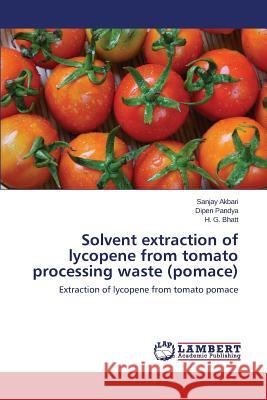Solvent extraction of lycopene from tomato processing waste (pomace) » książka
Solvent extraction of lycopene from tomato processing waste (pomace)
ISBN-13: 9783659785832 / Angielski / Miękka / 2015 / 92 str.
The important carotenoid in tomatoes i. e. lycopene having antioxidant capability has led to promising results in decreasing the risk of some illnesses and diseases. The tomato processing waste (pomace) is considered to be the potential raw material for production of natural lycopene. The purpose behind conventional solvent extraction method is a cheaper technology as compared to other modern technologies. It can be satisfactorily intended in the food systems as a functional ingredient. For the maximum recovery of lycopene from tomato pomace was carried out by selecting the suitable solvent system, temperature-time combination and feed to solvent ratio, i.e. Acetone: Ethyl acetate (1:1), 40 C/5 h and 1:30 (w/v). By using optimized solvent extraction process and had the lycopene content 611.105 mg/100 g, purity 81.319 %, refractive index 1.37604 and colour value 5.59 L*, 8.00 a*, 6.14 b*. There was 53.4 % reduction in the lycopene content after 60 days of storage at room temperature while at refrigerated condition, it was found safe with just 2.6 % reduction in lycopene content.
The important carotenoid in tomatoes i. e. lycopene having antioxidant capability has led to promising results in decreasing the risk of some illnesses and diseases. The tomato processing waste (pomace) is considered to be the potential raw material for production of natural lycopene. The purpose behind conventional solvent extraction method is a cheaper technology as compared to other modern technologies. It can be satisfactorily intended in the food systems as a functional ingredient. For the maximum recovery of lycopene from tomato pomace was carried out by selecting the suitable solvent system, temperature-time combination and feed to solvent ratio, i.e. Acetone: Ethyl acetate (1:1), 40 ºC/5 h and 1:30 (w/v). By using optimized solvent extraction process and had the lycopene content 611.105 mg/100 g, purity 81.319 %, refractive index 1.37604 and colour value 5.59 L*, 8.00 a*, 6.14 b*. There was 53.4 % reduction in the lycopene content after 60 days of storage at room temperature while at refrigerated condition, it was found safe with just 2.6 % reduction in lycopene content.











